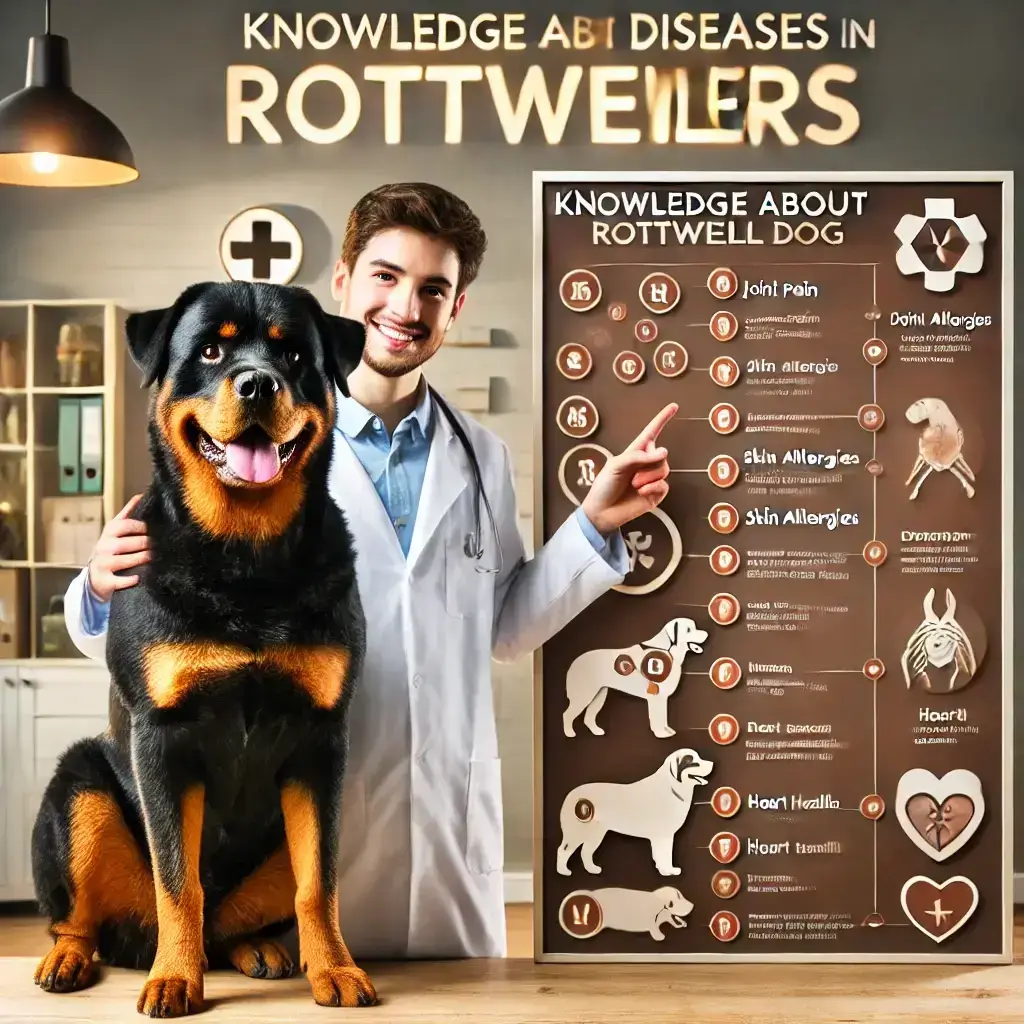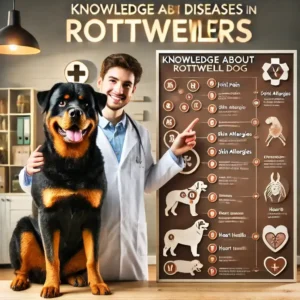Rottweiler Health Problems: Common Rottweiler Diseases
Common Rottweiler diseases Rottweilers are solid and faithful pooches, but they can confront different well-being challenges. Understanding these common infections is important for their well-being, especially in male Rottweilers. This article investigates the foremost health issues Rottweilers encounter and offers tips on keeping them solid and upbeat.
- Rottweiler Health Problems: Common Rottweiler Diseases
- Key Takeaways
- Rottweiler Health Problems: Rottweiler Owner Should Know
- The Importance of Responsible Breeding
- Common Heart Diseases in Rottweilers|Rottweiler Health Problems
- Rottweiler Health Problems| Joint and Bone Issues
- Skin and Sensitivity Issues
- Rottweiler Health Problems| Knowledge about the diseases
- Preventative Measures for Common Rottweiler Diseases
- Conclusion
- Frequently Asked Questions
Key Takeaways
- Standard vet check-ups are fundamental for the early discovery of well-being issues.
- Rottweilers are one breed prone to heart issues, so observing their heart well-being is imperative for their overall health.
- Maintaining a solid weight can anticipate obesity-related well-being issues that Rottweilers can be prone to.
- Scheduled eye exams can offer assistance in capturing conditions like cataracts early.
- An adjusted slim down and workout are key to keeping Rottweilers solid.
Rottweiler Health Problems: Rottweiler Owner Should Know

Common Rottweiler Health Problems
Rottweilers are a popular breed of dog that are renowned for their power, loyalty, and intelligence. But they can also be susceptible to certain health problems. They are susceptible to some health issues like many other breeds. Owners can take preventative action to protect their Rottweiler’s health by being aware of the common health problems that they face. Osteosarcoma is a type of bone cancer that can cause lameness in affected dogs. Other prevalent health problems in Rottweilers include arthritis, bloat, and other cancers.
Risk of Developing Cancer
Cancer affects Rottweilers more frequently than other breeds, with certain types of the condition being more prevalent among them. Rottweilers have a high incidence of osteosarcoma, especially in their youth, resulting in severe pain and mobility challenges. Two other types of cancer, hemangiosarcoma and liposarcoma, can affect Rottweilers. Early detection is vital to your dog’s prognosis, so be vigilant for signs and be consistent with veterinary appointments.
Joint Problems and Cruciate Ligament Injuries
Joint problems are another common health issue seen in Rottweilers. Conditions like hip dysplasia and elbow dysplasia can lead to arthritis later in life. Additionally, Rottweilers are at a higher risk of cruciate ligament injuries, which can cause significant lameness and require surgical intervention. Keeping your Rottweiler at a healthy weight can help reduce the risk of these joint problems.
The Importance of Responsible Breeding
When acquiring a Rottweiler, it is crucial to choose a reputable breeder who conducts health screenings on their breeding dogs. Responsible breeders will test for common diseases and conditions that can affect Rottweilers, ensuring that your puppy has the best chance for a healthy life. It is essential to ask about the health history of the puppy’s parents and any known issues within the bloodline.
Keeping Your Rottweiler Healthy
To mitigate the risk of developing common health issues, Rottweiler owners should focus on maintaining a balanced diet, encouraging regular exercise, and scheduling routine veterinary check-ups for their Rottweiler’s health. Obesity is a prevalent problem that can exacerbate joint issues and lead to significant health concerns in Rottweilers. By providing a proper diet and ensuring your dog gets adequate exercise, you can help keep your Rottweiler healthy and happy.
Rottweiler Temperament and Health Management
Rottweilers are known for their strong and confident temperament, making them excellent working dogs and companions. However, their physical and mental health are closely linked to their overall behavior. A healthy Rottweiler is more likely to exhibit the ideal temperament, so addressing health concerns early on can lead to a more balanced and well-adjusted dog.
Common Heart Diseases in Rottweilers|Rottweiler Health Problems
Rottweilers can confront different heart issues that will influence their general well-being. Normal check-ups are fundamental to capture these issues early. Here are a few common heart conditions:
Subaortic Stenosis
Subaortic stenosis (SAS) is a condition in which the aortic valve is contracted, making it difficult for the heart to pump blood. This can lead to genuine complications, including sudden passing in untreated Rottweiler puppies. Heart murmurs are frequently the primary sign recognized by a veterinarian, and symptoms include various heart-related issues.
Cardiomyopathy
Cardiomyopathy is an illness of the heart muscle that can lead to heart failure, a condition that Rottweilers are also at risk for from an early age. Side effects may include drowsiness, hacking, and trouble breathing, which can be concerning for owners of intelligent dogs like Rottweilers. Early location through customary veterinary visits is vital for overseeing this condition.
Aortic Stenosis
Aortic stenosis is another genetic condition where the aortic valve is also limited, which breeders should be aware of to identify their dogs as clear of this issue. This strengthens the heart to work harder, which can lead to swooning or working out narrow-mindedness. Pooches with this condition may, as it were appear side effects once they are more seasoned, making customary screenings critical.
Rottweiler Health Problems| Joint and Bone Issues

Rottweilers are prone to various joint and bone issues that can affect their quality of life, making it important for breeders to identify their dogs as clear of hereditary problems. Understanding these conditions is important for pet proprietors to guarantee their Rottweilers stay sound and dynamic.
Hip Dysplasia
Hip dysplasia is a common condition in Rottweilers where the hip joint doesn’t fit properly into the hip socket. This can lead to torment and joint pain, impacting the overall dog’s health, especially if Rottweilers are prone to obesity-related well-being issues. Signs incorporate:
- Limping
- Trouble getting up
- Hesitance to work out
Elbow Dysplasia
Elbow dysplasia is another hereditary condition affecting the elbow joint, which many Rottweilers are also susceptible to. Indications may include:
- Swelling around the elbow is one of the most common issues seen in Rottweilers.
- Weakness within the front legs
- Anomalous stride
Osteochondrosis Dissecta (OCD)
OCD occurs when the cartilage in a joint is created inappropriately, leading to torment and aggravation. It’s regularly seen in larger breeds like Rottweilers, which are a popular dog choice among families. Treatment alternatives incorporate:
- Weight management
- Pharmaceuticals
- Surgery for serious cases
Skin and Sensitivity Issues
Rottweilers can confront different skin and hypersensitivity issues that will cause inconvenience and can be prone to developing certain types of cancer. These issues can stem from diverse sources, including nutrition and natural variables, affecting many Rottweilers who are prone to certain health problems. Here are a few common conditions:
Insect Chomp Extreme touchiness
- Typically, an unfavorably susceptible response to insect spit, driving to strong tingling and skin botheration.
- Common signs include scratching and hair loss, particularly around the tail and back, which has been reported in Rottweilers.
- Anticipation incorporates standard insect medications and maintaining a clean environment to ensure a dog’s health.
Pyotraumatic Dermatitis (Hot Spots)
- Hot spots are localized areas of skin aggravation and disease, frequently caused by intemperate licking or scratching, and are one of the most common issues in Rottweilers, especially female Rottweilers.
- They can be created rapidly and may require veterinary treatment to recuperate legitimately.
- Keeping the dog’s skin clean and dry can offer assistance in anticipating these spots.
Nutritional Sensitivities
Rottweilers can develop sensitivities to certain fixings in their food diets, leading to side effects like tingling, ear irritation, and gastrointestinal disturbance, which can be reported in Rottweilers.
Rottweiler Health Problems| Knowledge about the diseases

Owning a Rottweiler can be a rewarding experience, but it is essential to know about the diseases that may affect this breed.
Rottweilers are smart and intelligent dog breeds, known for their loyalty and protective nature.
However, Rottweilers aren’t without their health issues, which can affect their quality of life.
The presence of symptoms like tiredness, appetite loss, and peculiar behavior in Rottweilers may signify underlying health problems, and it is vital for prospective owners to be aware that this breed is prone to a variety of health difficulties.
Regular check-ups
Regular check-ups and health clearances can help in early detection of potential issues. Eye problems are common in Rottweilers and, if ignored, can cause serious issues. Moreover, this breed is prone to specific cancers, which can be particularly threatening to females.
Health and well-being
Rottweilers have an average lifespan Rottweilers can be influenced by their health and well-being. With an average lifespan of around 8 to 10 years, maintaining their health and well-being is crucial to ensuring they live a full life. Rottweilers need regular exercise and mental stimulation, as they are rottweiler active dogs that thrive on physical activity. Engaging them in activities that tap into their herding dog instincts can help keep them fit and happy.
However, it’s important to note that a dog may experience health issues if not properly cared for. For example, dog bloats, which is a serious condition that can affect large breeds, can occur if they consume their food too quickly or engage in intense exercise right after eating.
Rottweiler Club
Being part of a Rottweiler club can provide valuable resources for owners to learn more about the breed’s specific health concerns. Knowledge sharing among experienced owners can help mitigate risks associated with common diseases. Understanding that a dog is likely to develop certain health problems can empower owners to take proactive measures in their care.
Ultimately, with the right information and commitment to their well-being, Rottweilers can lead happy, healthy lives, making them a cherished member of any family.
- Common allergens include meat, chicken, and grains.
- A vet can offer assistance in recognizing food sensitivities through elimination diets.
- By being mindful of these common skin and sensitivity issues, you’ll be able to offer assistance to keep your Rottweiler comfortable and solid.
Preventative Measures for Common Rottweiler Diseases

Taking care of your Rottweiler’s prosperity is fundamental. Preventative care is urgent to help American Rottweilers live long and happy lives. Here are some key measures you’ll take:
- Plan yearly vet visits to capture any well-being issues early.
- Keep up with inoculations to protect against illnesses that Rottweilers are likely to develop.
- Talk about any concerns about your dog’s well-being with your vet, especially since Rottweilers are loyal companions.
Legitimate Eat less and Work out
- Nourish your Rottweiler with an adjusted slim down to preserve a sound weight.
- Guarantee they get a normal workout to keep their joints and heart solid, as Rottweilers make excellent exercise companions.
- Screen their nutritional intake to avoid weight gain, which can lead to other well-being issues, including Rottweilers.
Pet Protections
- Consider getting pet protection to assist in covering unforeseen restorative costs.
- Inquire about diverse plans to discover one that suits your needs.
- Having protections can give you peace of mind in case of a crisis.
Keeping your Rottweiler sound requires commitment and care. By taking these steps, you’ll offer assistance anticipate common illnesses and guarantee your fuzzy companion remains upbeat and dynamic.
| Degree | Significance |
| Customary Vet Check-ups | Early discovery of certain health issues is crucial for many dogs. |
| Eat less and Work out | Anticipates weight and related wellbeing issues |
| Pet Protections | Financial bolster for unforeseen vet bills |
Conclusion
Rottweilers are solid and persevering pooches, but they can stand up to a few successful challenges. Common issues connected to heart issues and far off better, a much better, a higher, a stronger, an improved a removed better chance of certain cancers. A standard veterinary regimen and careful calorie counting are key to preserving their exceptional form.
Rottweiler Health Problems
Awareness of these health hazards can enable you to provide more effective care for your Rottweiler. By being vigilant and taking initiative, you can offer your shaggy friend a long, fulfilling life.
Frequently Asked Questions
1. What are the most common Rottweiler Health Problems?
Rottweilers are prone to several health issues, including hip and elbow dysplasia, aggressive bone cancer, heart problems, and certain types of skin conditions. Hip and elbow dysplasia are particularly common in large breeds like the Rottweiler, often leading to arthritis as the dog ages. Regular veterinary check-ups can help detect these issues early.
2. How does age affect Rottweiler Health Problems?
As Rottweilers age, they become increasingly susceptible to various health problems. Many conditions, such as hip dysplasia and heart disease, often manifest in dogs older than 12 months of age. The risk of developing these diseases typically increases as the dog matures. Owners need to monitor their Rottweiler’s health closely as they age.
3. What symptoms should I look out for in my Rottweiler?
Common symptoms that may indicate health issues in Rottweilers include limping, difficulty in movement, excessive panting, coughing, or changes in appetite. Symptoms typically start with subtle changes that owners may overlook, so it’s important to be vigilant. Regular health screenings can help catch symptoms early.
4. Can diet impact the health of my Rottweiler?
Yes, diet plays a crucial role in a Rottweiler’s health. A balanced diet helps maintain an appropriate weight, reducing the risk of conditions like hip dysplasia or obesity-related diseases. Rottweilers require a diet rich in protein and low in fillers. Consulting with a veterinarian to create a suitable diet plan is advisable.
5. Are Rottweilers prone to genetic health issues?
Rottweilers can be prone to genetic health issues, particularly those related to their joints and heart. Conditions such as hip and elbow dysplasia, as well as aggressive bone cancer, can have a hereditary component. Responsible breeding practices can minimize these risks; hence, it’s essential to acquire Rottweilers from reputable breeders who conduct health screenings.
6. How can I prevent health problems in my Rottweiler?
Preventing health issues in Rottweilers involves regular veterinary check-ups, a balanced diet, regular exercise, and maintaining a healthy weight. Vaccinations and parasite control are also










